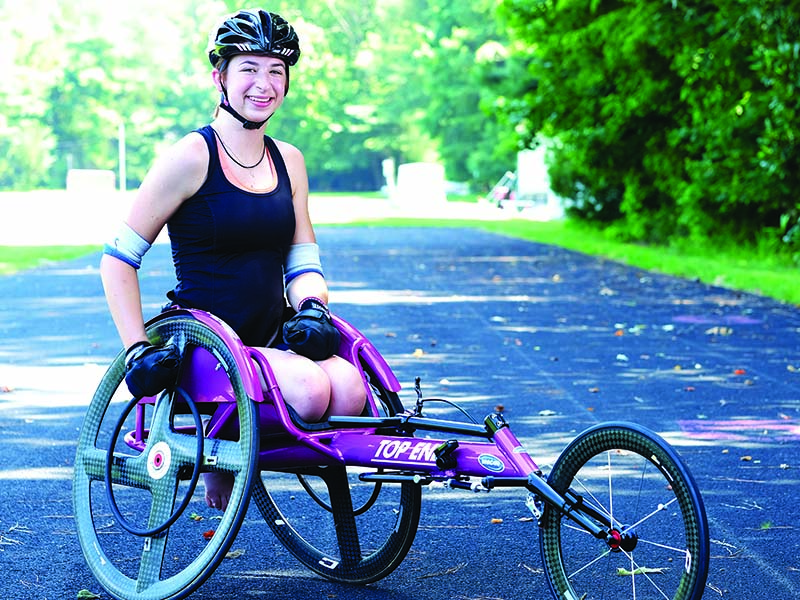Spunk and Skill: Alexa Halko Finds Herself in Adaptive Sports
If you found yourself, as I did recently, sitting at a local Starbucks, chatting over strawberry smoothies with 16-year-old Alexa Halko, you would likely never guess two all-important things about her.
First, that due to cerebral palsy she’s struggled her whole life with “walking all crazy,” in spite of numerous surgeries, years of physical therapy, Botox treatments, and wearing splints every night.
And two, that she’s one of the world’s best in wheelchair racing. After becoming a U.S. Paralympic athlete in 2014, she competed last year in Qatar, last month in London, and next month she’s headed to the Paralympic Games in Rio de Janeiro as the track and field team’s youngest female, having already set two world records this summer.
A rising junior at Williamsburg’s Jamestown High School, she’s remarkably easygoing, seemingly unfazed by either the daily challenges of her cerebral palsy or the international competitions in her future. Slightly shy, but with a ready laugh, she sounds like many teens—says it’s harder to train in the lazy days of summer, and that watching movies and going to Barnes & Noble are favorite activities in her free time.
Given her athletic success, most surprising is her humility, as if she can’t yet imagine what one U.S. Paralympic coach already knows—that Alexa’s “going to take this sport to a whole new level.”
Speed and freedom at last attainable
Alexa was diagnosed at 18 months with spastic diplegia, a comparatively mild form of cerebral palsy affecting her only from the waist down. The spasticity (or constant contractions) of her leg muscles causes tightness that makes walking somewhat difficult, and she struggles with balance, sometimes tripping. She also “teeters” when she walks and has to hold railings when climbing stairs.
Still, she insists, “I have it a lot easier than a lot of people.” Of her medical treatments over the years, she says, “If I didn’t do all those things, I would be walking horribly.”
She first tried wheelchair racing at age seven when her family lived in Oklahoma. A woman with a local adaptive sports program (for athletes with disabilities) noticed Alexa’s walking and asked if she’d consider trying wheelchair sports.
Alexa’s mother, Elesha, explains that for many with cerebral palsy, if they can walk at all, a wheelchair is seen as a last resort.
At that time, Alexa walked only with substantial effort, and she would soon have major surgery to improve her situation. “Our goal has always been to keep her walking,” Elesha says, but she and her husband Peter, in the end, changed their minds.
And Alexa, after her first turn in a borrowed racing chair, was hooked.
“I instantly loved it,” she says emphatically, laughing now at the memory. “See…back then I was going slow everywhere, and tripping, catching myself all the time. And whenever I was actually in the chair, it was a way to go way faster than I’d ever been able to move around.”
This girl’s “going to be good”
Thus began her new chapter in adaptive sports, with wheelchair basketball every fall, and wheelchair racing every spring.
Even early on Alexa exhibited exceptional racing prowess, and Elesha says U.S. Paralympics coaches had been watching her (as an athlete with a disability) at camps and competitions since she was 10, when she first qualified to compete at the junior national level. Once she turned 14, she was invited to get a Paralympics license and compete internationally on the U.S. team. She now takes part in 100-, 400- and 800-meter events, in the Paralympics’ T34 classification, with athletes who have similar neurological conditions.
Moving to Williamsburg around that same time, Alexa connected with Sportable (www.sportable.org), an adaptive sports program in Richmond. They had no track team, but she began playing wheelchair basketball on their Sportable Spokes team that, this past April, won a national championship. For Alexa’s wheelchair racing, Elesha found Drew Mearns, a well-known expert in American track and field who now coaches elite runners throughout Williamsburg with his Growing Runners program. He had no experience with wheelchair sports, but his regular workouts for runners have helped Alexa progress.
She now trains about three hours daily, including track or trail workouts in her racing chair, swimming, strength training, stretching and yoga. During the school year, she adds wheelchair basketball to the mix.
Some observers attribute her success to her perennially positive attitude, but more important, her coaches say, has been her willingness to make changes for the better.
Teresa Skinner, a U.S. Paralympic coach in Spokane, Washington, who specializes in wheelchair racing, has worked with Alexa for years, first at various camps and more recently at international competitions. “She’s extremely coachable and has been from the beginning,” says Skinner. And she adds: “When you do what I do for many years, you can definitely spot raw talent, and I could tell that this girl was going to be really good.”
This past June, in the T34 800-meter event at the “Fast Cow” Invitational races in Indiana, Alexa set her first world record—a time of two minutes and 2.74 seconds—smashing the record held by one of her main international competitors, a British woman eight years her senior. Alexa was then qualified to compete in the U.S. Paralympic Trials in Charlotte late that month. There in the 800, she powered through what felt like “a wall of wind,” fearing she wouldn’t finish, but instead broke her own world record, punching her ticket to Rio.
At a recent training session with Mearns on a muggy afternoon, she looked the athlete part: Wearing a sleek black singlet, her helmet and gloves, she knelt in her magenta racing chair. Keeping her head low, she practiced starts on the track again and again, aiming for the explosive bursts of speed that Mearns knows can shorten her race times.
After practice, though, Alexa looked like the teen that she is, her shoulder-length hair pulled back in a scrunchie, fingernails painted a bright teal, her bare feet in hot pink Crocs.
At 16, Mearns says, she has plenty of time to enjoy where she is right now, even if she seems ready to take her sport by storm. “She has a lot of growing to do [as a racer], so she can set her own pace,” says Mearns. “There’s no reason to rush it as long as she gets so much joy out of it.”
For Alexa, all the effort’s been worth it. She’s achieved her longtime goal—going to Rio—and she’s had a blast doing it. Plus, she’s improved her health and has won many friends among more experienced athletes, whose guidance has helped in her sport, and whose company has made every competition feel like a reunion.
Succeeding in adaptive sports, says Alexa, “has changed everything for me.”


